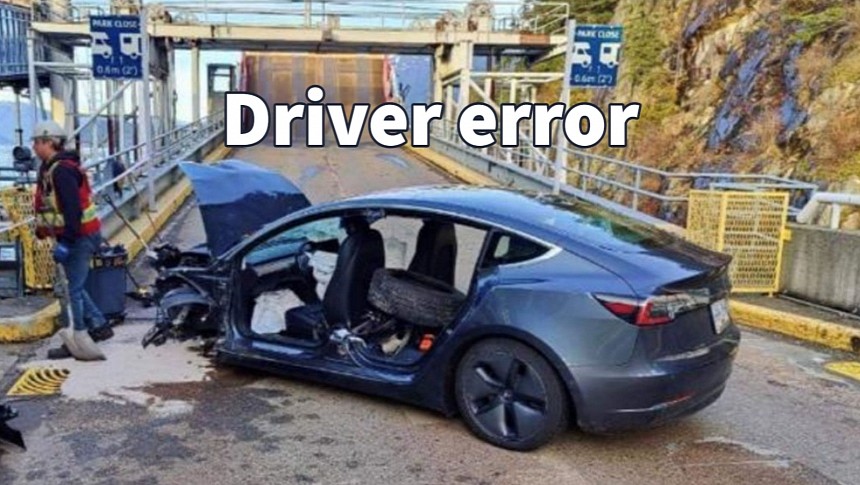In January, a Tesla Model 3 allegedly accelerated on its own and smashed into the West Vancouver ferry terminal ramp. The investigation revealed that the crash was not caused by a sudden unintended acceleration (SUA) event but by driver error.
Tesla EVs have been involved in many crashes with a common defining characteristic: the drivers claim the car accelerated out of control and pressing the brakes doesn't help. This is called "sudden unintended acceleration" (SUA) and has been the root cause of many car crashes involving many car brands besides Tesla. Probably the most notorious SUA cases were the ones that prompted Toyota to recall 10 million vehicles from September 2009 to March 2010.
There are many reasons why Teslas seem to be affected by this problem more than other car brands. One is the media coverage that Tesla, in general, and the Tesla Autopilot, in particular, get. Every time a Tesla crashes, the media starts questioning whether the Autopilot or even FSD Beta, Tesla's self-driving software, is to blame. Tesla Autopilot's name has also given people false hopes that the cars drive themselves.
Another reason stems from the very design of Tesla EVs, which encourages drivers to use the so-called "one-pedal driving." Based on the findings of a Greek accident investigator, Tesla's implementation of one-pedal driving allows drivers to switch into Reverse without applying brakes. This makes it more likely that they press the accelerator when they want to apply the brakes. It's also why the driver strongly believes they pushed the brake pedal when, in fact, they were pressing the accelerator.
This was also the case with the driver who smashed their Tesla into the West Vancouver ferry terminal ramp in January. After analyzing the vehicle data, the investigators determined that the collision was caused by human error. More specifically, the 68-year-old driver pressed the wrong pedal when maneuvering to drive on the ramp. As a result of the investigation, the driver was fined for driving without due care and attention. They would also have to pay for damages to the ferry structure.
The NHTSA investigated over 200 crashes involving Teslas, and in all cases, the agency concluded that the crashes were caused by driver error. Still, mistakes caused by Tesla's implementation of one-pedal driving have caused severe crashes. This is why Tesla decided to act in China, where the EV maker faced an investigation over several SUA events. Tesla announced a voluntary recall for more than 1.1 million cars.
The 2023.12.9 update in China is designed to prevent SUA incidents but doesn't offer the same benefits in other regions. The update changes how regenerative braking works and makes Creep the default Stopping Mode. This forces drivers to keep their foot on the brakes during low-speed maneuvers, similar to how drivers of ICE vehicles with automatic transmissions do. The changes should significantly reduce false SUA occurrences, and we wonder why Tesla doesn't implement them in the US and Europe.
There are many reasons why Teslas seem to be affected by this problem more than other car brands. One is the media coverage that Tesla, in general, and the Tesla Autopilot, in particular, get. Every time a Tesla crashes, the media starts questioning whether the Autopilot or even FSD Beta, Tesla's self-driving software, is to blame. Tesla Autopilot's name has also given people false hopes that the cars drive themselves.
Another reason stems from the very design of Tesla EVs, which encourages drivers to use the so-called "one-pedal driving." Based on the findings of a Greek accident investigator, Tesla's implementation of one-pedal driving allows drivers to switch into Reverse without applying brakes. This makes it more likely that they press the accelerator when they want to apply the brakes. It's also why the driver strongly believes they pushed the brake pedal when, in fact, they were pressing the accelerator.
This was also the case with the driver who smashed their Tesla into the West Vancouver ferry terminal ramp in January. After analyzing the vehicle data, the investigators determined that the collision was caused by human error. More specifically, the 68-year-old driver pressed the wrong pedal when maneuvering to drive on the ramp. As a result of the investigation, the driver was fined for driving without due care and attention. They would also have to pay for damages to the ferry structure.
The NHTSA investigated over 200 crashes involving Teslas, and in all cases, the agency concluded that the crashes were caused by driver error. Still, mistakes caused by Tesla's implementation of one-pedal driving have caused severe crashes. This is why Tesla decided to act in China, where the EV maker faced an investigation over several SUA events. Tesla announced a voluntary recall for more than 1.1 million cars.
The 2023.12.9 update in China is designed to prevent SUA incidents but doesn't offer the same benefits in other regions. The update changes how regenerative braking works and makes Creep the default Stopping Mode. This forces drivers to keep their foot on the brakes during low-speed maneuvers, similar to how drivers of ICE vehicles with automatic transmissions do. The changes should significantly reduce false SUA occurrences, and we wonder why Tesla doesn't implement them in the US and Europe.







